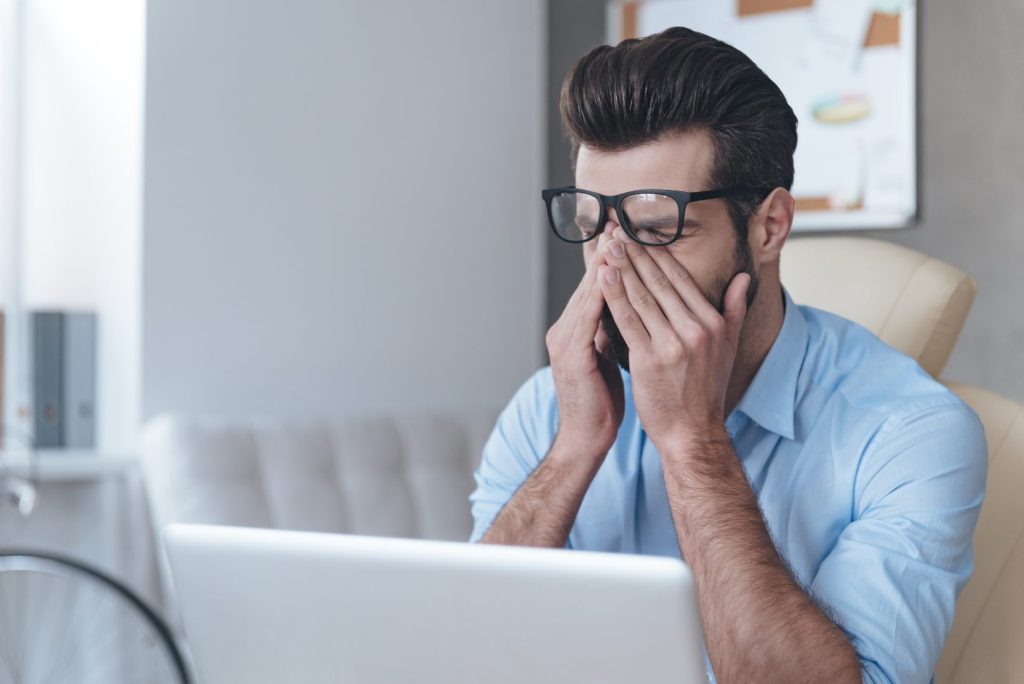If you have days when you look round the office and wonder if you’ve stumbled onto the set of a zombie movie, there’s a good reason. Many of your colleagues or staff are likely to be acutely or chronically sleep-deprived. According to a 2018 parliamentary briefing, one third of UK adults report at least one episode of difficulty sleeping on a majority of nights. It also notes that the average amount of sleep which adults need is 8 hours, whereas the average they’re getting is 7 hours. In fact, the CDC considers that around one-third of Americans are chronically sleep-deprived, which is in line with some UK estimates.
Most of us know how debilitating acute sleep deprivation can be. A night without sleep, for example, impairs driving more than consuming alcohol over the legal limit. What’s less well recognised is the effects of even moderate sleep deprivation. One study found just 18 hours without sleep (say, being up from 7 am to 1 am) has the same impact as illegal quantities of booze.
What does this mean for productivity at work? It’s not good news. Sleep-deprivation affects a laundry list of every cognitive function that underpins productive work, including creative and divergent thinking, ability to perform complex mental tasks, selective attention (the ability to focus) and working memory. And that’s before we get into the effects on immune function and long-term health conditions.
This leaves organisations in something of a quandary. Many of their staff are, at the least, losing productivity through insufficient quality sleep, yet their HR teams cannot intervene. As an aside, it’s an oddity of our culture that an employee reeking of alcohol might be sent home immediately, but no equivalent response to someone who has been up all night.
Is sleep education the answer?
We don’t, thank goodness, live in a culture where we can dictate our employees’ sleep patterns. All we can hope to do is educate our teams about sleep and leave them to make their own choices.
One response to the problem of sleep deprivation could be to discuss the issue with colleagues and provide them with links to useful resources. The most common form these come in are articles offering tips for getting better sleep. There’s no shortage of them: our quick google for ‘tips for a good night’s sleep’ turned up 16 million results,
So, point them in the right direction and job done?
Unfortunately, probably not. Despite millions of articles, despite this wealth of solid sleep advice, sleep-debt is only predicted to rise.
And maybe that’s because there are two big problems with this prescriptive, bite-sized approach: missing the big picture and lack of personalisation.
Top tips miss the big picture
One problem with focusing on sleep hygiene tips is that it’s easy to miss the wider context. Sleep is profoundly integrated into just about every aspect of our psychology and biology.
For example, anxiety about work is a common ‘precipitating factor’, which sparks a bout of insomnia. ‘Perpetuating factors’, such as (ironically) anxiety about insomnia, establish this as an unwelcome new sleep-deprived pattern. Chronic sleep deprivation then leads to poorer performance at work, leading to more anxiety — and so the cycle continues.
It’s the same story with sleep and nutrition. There’s evidence that unhealthy eating impacts quality of sleep, but conversely poor sleep increases craving for high calorie food.
The point is that sleep refuses to be confined to a neat list of top tips. To meaningfully address sleep deprivation at work needs a wider strategy — one that looks holistically at employee mental and physical health.
Sleep advice is nothing personal
The other area where bite-size advice falls short is lack of personalisation. Knowing about a health-related issue is the easy part. The more difficult trick is applying it to your own life. We all know by now which foods are healthy and unhealthy, but that doesn’t always stop us when someone brings doughnuts into the office.
And it’s the same thing with sleep education. Most of us know that we shouldn’t look at bright smartphone screens before bed, but that can be difficult to apply when our WhatsApp group decides it’s time for a late-night chat.
A key way of personalising sleep advice is through providing feedback — in other words, by monitoring sleep. With wearable technology, it’s now possible for anyone to get a reasonable indication of their sleep duration and quality. This immediate feedback personalises that abstract knowledge, turning I’ll-do-something-about-my-sleep-sometime into an issue that needs action. It’s like the difference between reading about the benefits of exercise and seeing that unflattering holiday photo.
Our top tip – look beyond top tips
If all this sounds like we’re looking down our noses at sleep advice articles, we’re really not. They’re a remarkable democratisation of knowledge, often providing high-quality information in a digestible form.
But by themselves, we would say they’re not enough to address the sleep deprivation epidemic which plagues our workplaces. To really support colleagues to become healthier and more productive needs a more integrated, feedback-based approach.
ART Health Solutions is a wellbeing consultancy, providing science-based, holistic wellbeing recommendations. Our solutions use wearable technology to gather secure, anonymised data directly from the organisation and its employees. For all enquiries, please contact our friendly team.
